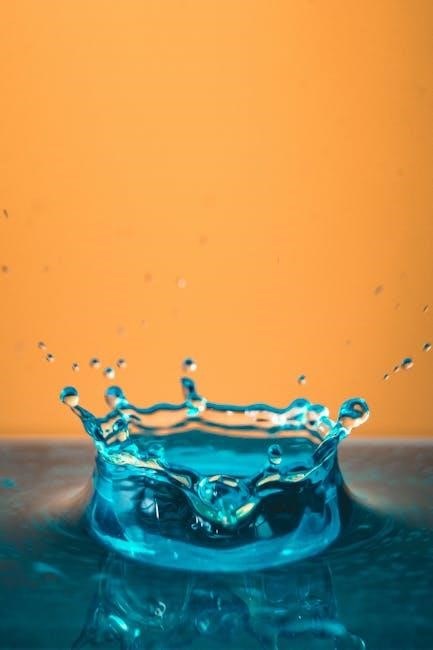Energy efficiency in water heaters is crucial for reducing energy consumption and lowering utility bills. Modern technologies offer sustainable solutions to heat water effectively while minimizing environmental impact.
Understanding the Importance of Energy Efficiency in Water Heaters
Energy efficiency in water heaters is vital for reducing energy consumption and lowering utility bills. It minimizes environmental impact by decreasing greenhouse gas emissions. Efficient water heaters consume less energy while maintaining performance‚ making them cost-effective in the long run. With rising energy costs‚ optimizing water heater efficiency becomes essential for homeowners. It also enhances the overall performance and lifespan of the appliance. By choosing energy-efficient models‚ users can contribute to sustainability and enjoy significant savings over time.
Types of Water Heaters and Their Energy Efficiency
Conventional storage tank‚ tankless‚ heat pump‚ and solar water heaters offer varying levels of energy efficiency‚ catering to different needs and preferences for optimal performance.
Conventional Storage Tank Water Heaters
Conventional storage tank water heaters are the most common type‚ using a insulated tank to store heated water. They operate by continuously heating water‚ even when not in use‚ leading to standby energy loss. Traditional models are typically less energy-efficient compared to modern alternatives like tankless or heat pump systems. However‚ advancements in insulation and design have improved their efficiency. These heaters are often placed in basements or utility rooms‚ with concerns about long runs to upper floors affecting performance. Adjusting the temperature to 120°F can enhance safety and efficiency while reducing energy consumption.
Tankless Water Heaters
Tankless water heaters‚ also known as on-demand heaters‚ provide hot water only when needed‚ eliminating the need for a storage tank. This design reduces standby energy loss‚ making them more energy-efficient than conventional models. They are space-saving and can be installed on walls‚ freeing up floor space. However‚ they may require higher upfront costs and professional installation. Tankless heaters are ideal for households with consistent hot water demands‚ offering a reliable and efficient solution for modern homes seeking to optimize their water heating systems and lower energy consumption over time.
Heat Pump Water Heaters
Heat pump water heaters are highly efficient‚ using ambient heat to warm water‚ making them up to 3-4 times more efficient than traditional electric heaters. They extract heat from the air or ground‚ reducing energy consumption significantly. Ideal for warmer climates‚ these systems can save homeowners between $100 to $300 annually in electricity costs. Additionally‚ they often qualify for rebates and incentives‚ further enhancing their cost-effectiveness. Heat pump water heaters are eco-friendly and suitable for various household sizes‚ offering a sustainable and energy-saving solution for modern water heating needs.
Solar Water Heaters
Solar water heaters are an eco-friendly solution that harness renewable energy from the sun to heat water. They use solar panels to capture heat‚ which is then transferred to a storage tank. This system significantly reduces energy consumption and lowers utility bills. While initial installation costs are higher‚ long-term savings and incentives make them a cost-effective option. Solar water heaters are reliable‚ produce no emissions‚ and are ideal for homes with ample sunlight‚ making them a sustainable choice for environmentally conscious homeowners seeking energy efficiency.

Energy Efficiency Ratings and Standards
Energy efficiency ratings for water heaters are measured using the Energy Factor (EF)‚ which assesses how efficiently heat is transferred to water. Higher EF values indicate better efficiency‚ helping consumers compare models and make informed decisions to reduce energy consumption and costs.
Energy Factor (EF) and Standby Loss
The Energy Factor (EF) measures a water heater’s efficiency by assessing how much of the input energy is converted to usable hot water. A higher EF indicates better efficiency. Standby loss refers to the energy lost while water is stored in the tank‚ typically measured in watts. Minimizing standby loss is crucial for optimizing energy performance. Understanding EF and standby loss helps consumers evaluate and compare water heater models‚ ensuring they select the most efficient option for their needs and budget.
Comparing Energy Efficiency Across Different Models
When comparing water heater models‚ focus on their Energy Factor (EF) ratings‚ which indicate efficiency. Conventional models typically have lower EFs (0.8–0.9)‚ while tankless and heat pump models range higher (0.9–4.0). Solar heaters often exceed traditional models. Consider standby loss‚ measured in watts‚ as lower values mean less energy waste. Compare annual operating costs and energy consumption to determine long-term savings. Evaluating these factors helps identify the most efficient model for your needs and budget‚ ensuring optimal energy performance and cost-effectiveness over time.
Thermal Expansion and Energy Performance
Thermal expansion occurs as water heats and expands‚ potentially causing pressure increases in the system. This can lead to energy losses if not properly managed. Installing devices like expansion tanks or check valves helps mitigate these issues. Proper management of thermal expansion ensures stable pressure‚ reducing wear on the heater and maintaining energy efficiency. Regular system checks and appropriate sizing of components are essential to optimize performance and meet energy efficiency standards‚ ensuring reliable and cost-effective hot water delivery over time.
Cost Considerations and Savings
Energy-efficient water heaters often have higher upfront costs but offer long-term savings through reduced energy consumption. Operating costs depend on usage and efficiency‚ while rebates and incentives can offset initial expenses.
Upfront Costs vs. Long-Term Energy Savings
Energy-efficient water heaters typically require higher initial investments‚ but they deliver significant long-term savings through reduced energy bills. For example‚ heat pump water heaters can save homeowners between $100 and $300 annually in electricity costs. While the upfront cost may deter some‚ the cumulative savings over years often justify the expense. Additionally‚ rebates and incentives from utility companies or government programs can help offset initial costs‚ making energy-efficient models more financially accessible.
Operating Costs and Energy Consumption
Energy-efficient water heaters reduce operating costs by minimizing energy waste. Models with high Energy Factor (EF) ratings consume less energy‚ lowering monthly bills. Heat pump water heaters‚ for instance‚ can save $100–$300 annually. Standby loss‚ a key factor in energy consumption‚ is lower in advanced designs. By choosing efficient systems‚ homeowners can significantly reduce their energy footprint and enjoy long-term savings without compromising on performance or convenience.
Rebate Programs and Incentives for Energy-Efficient Models
Rebate programs and incentives are available to encourage the adoption of energy-efficient water heaters. Many states‚ like Texas‚ offer rebates for replacing traditional models with high-efficiency alternatives. Heat pump water heaters often qualify for federal tax credits and utility company incentives. These programs help offset the higher upfront costs of energy-efficient systems‚ making them more accessible. Additionally‚ ENERGY STAR certified models may offer further savings opportunities. Homeowners can significantly reduce their investment while contributing to environmental sustainability.

Maintenance and Troubleshooting for Optimal Energy Performance
Regular maintenance ensures your water heater operates efficiently. Check temperature settings‚ inspect insulation‚ and flush sediment annually. Resetting the heater can often resolve common issues quickly.
Regular Maintenance Tips for Energy Efficiency
Regular maintenance is key to ensuring your water heater operates efficiently. Start by checking the temperature setting and lowering it to 120°F for safety and energy savings. Insulate exposed pipes and the tank to reduce heat loss. Flush sediment from the tank annually to prevent buildup that reduces efficiency. Descale the tank if you have hard water to avoid mineral interference. Inspect the pressure relief valve and anode rod for corrosion. Finally‚ schedule professional checkups yearly to ensure optimal performance and longevity.
Common Issues and How to Reset Your Water Heater
Common issues with water heaters include no hot water‚ leaks‚ or strange noises. To reset your water heater‚ start by turning off the power and water supply. For gas heaters‚ switch the thermostat to “pilot” mode. For electric models‚ reset the circuit breaker or replace the high-limit switch. After resetting‚ check for leaks and ensure proper drainage. If issues persist‚ professional assistance may be needed. Regular maintenance‚ like annual inspections‚ can prevent these problems and ensure efficient operation. Always follow safety guidelines when performing resets.

Future Trends in Water Heater Technology
Advancements in heat pump and smart technologies are driving energy-efficient solutions. Solar water heaters and advanced controls are expected to dominate future trends‚ enhancing performance and sustainability significantly.

Emerging Technologies for Energy-Efficient Water Heating
Emerging technologies like advanced heat pumps and smart water heaters are revolutionizing energy efficiency. Heat pump water heaters use ambient air to heat water‚ significantly reducing energy consumption. Smart technology integration allows real-time monitoring and optimized performance. Solar water heaters are becoming more affordable and efficient‚ harnessing renewable energy. These innovations aim to reduce energy costs and environmental impact‚ offering homeowners sustainable and cost-effective solutions for their water heating needs.
The Role of Smart Technology in Water Heater Energy Management
Smart technology is transforming water heater energy management by enabling real-time monitoring and optimization. Advanced systems allow users to control temperature settings remotely‚ reducing standby heat loss. Smart sensors detect usage patterns‚ adjusting energy consumption for maximum efficiency. Integration with smart home systems enhances performance‚ offering insights to reduce waste. These innovations ensure consistent hot water delivery while minimizing energy costs and environmental impact‚ making water heating smarter and more sustainable for modern homes.



